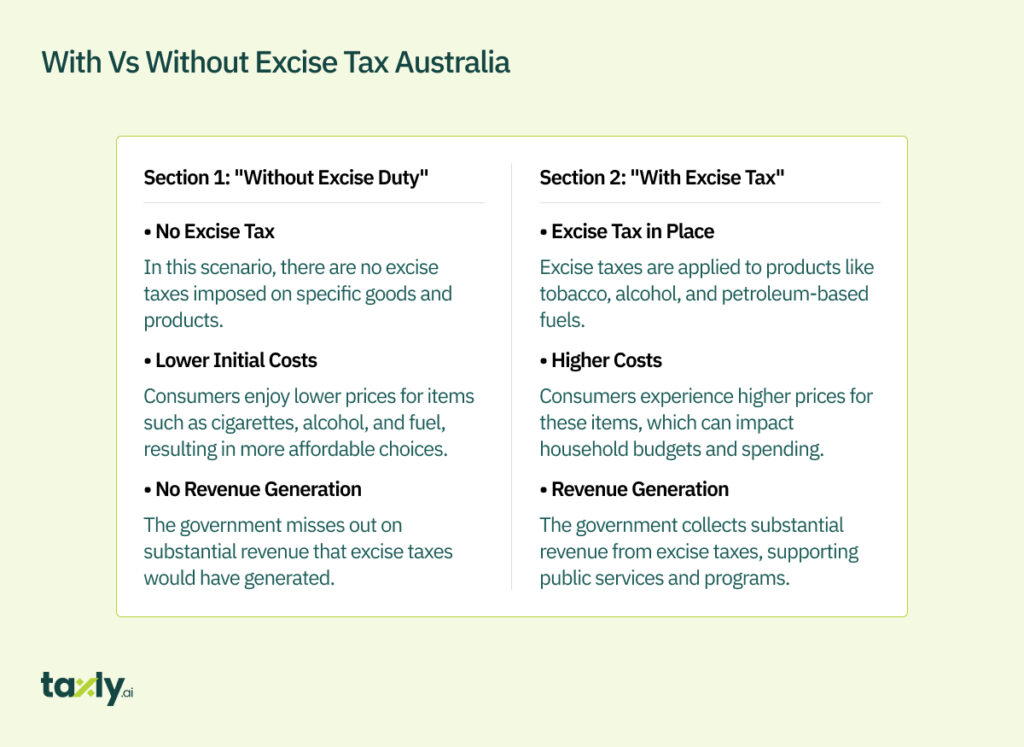Excise tax in Australia is a form of indirect taxation imposed on specific goods and products, typically those that are considered harmful, such as tobacco, alcohol, and petroleum. It’s an essential source of revenue for the government, while also serving regulatory and public health purposes.
Examples of Excise Tax Australia in Action
Tobacco Excise:
Sarah is a smoker who used to buy a pack of cigarettes for $20. But with a recent excise tax increase, that same pack now costs $25. Feeling the financial strain, Sarah decided to smoke less, showing how the tax hike both boosts government revenue and encourages healthier habits.
The tax on tobacco products in Australia is subject to regular increases. As of 2023, the tobacco excise is being increased by 5% per year for three years, starting on September 1, 2023 [source].
Alcohol Excise:
David is a small-scale craft beer brewer. When the government raised excise taxes on beer, David’s production costs shot up. To keep his beers affordable, he had to either raise prices, making them less budget-friendly for customers, or absorb the extra cost, impacting his business’s bottom line.
The excise duty rates on alcohol vary depending on factors such as the type and alcohol content. For example, the duty rate for “other excisable beverages not exceeding 10% by volume of alcohol” was $97.90 as of February 1, 2023 [source].
Petroleum Excise:
Emily is a working mother who commutes daily. She noticed that the price of petrol at her local gas station had jumped by 10% due to an increase in petroleum excise. This extra expense squeezed her household budget, forcing her to cut back on other expenses or explore alternative transportation options.
The excise tax on fuel in Australia varies based on the type of fuel. As of February 1, 2023, the excise tax rates on fuel and petroleum products increased by 3.7% [source].
Suggested Read: Your Complete Guide to Work Related Business Trip Tax Deduction
Who Pays Excise Tax Australia?
In Australia, excise tax is paid by individuals or businesses involved in the production, manufacture, or importation of certain excisable goods. These goods are subject to excise tax to help fund government services and infrastructure.
Manufacturers:
Businesses involved in the production or manufacture of excisable goods such as alcohol, fuel, and tobacco are responsible for paying excise tax.
Importers:
Importers of excisable goods are also required to pay excise tax on these products.
Suggested Read: Australian Goods and Service Tax [EXPLAINED]
When Excise Tax is Paid?
Excise tax is typically paid before the excisable goods are delivered into the Australian domestic market. This ensures that the tax is collected before these goods enter circulation.

Why Excise Tax Australia Imposed?
Revenue Generation:
Excise tax is a source of revenue for the government, and the funds collected are used to support public services, infrastructure, and various government programs.
Public Health Control and Regulation:
Excise tax is also used as a regulatory tool to manage the consumption of certain goods, such as alcohol and tobacco, by making them more expensive, thereby discouraging excessive consumption.
Environmental Protection:
In the case of petroleum-based fuels, excise tax can influence environmental objectives. Taxation policies can incentivize the use of cleaner and more sustainable energy sources.
History of Excise Tax Australia
1801 – Early Excise Taxes:
Excise taxes in Australia date back to the colonial period, with the first excise on alcohol being imposed in 1801. Over time, excise taxes were extended to other goods, including tobacco and gasoline.
1957 – Fuel Excise Tax Revised:
The fuel excise underwent a significant revision in 1957 when diesel vehicle operators were asked to contribute to road funding.
1983 – Excise Tax Indexation:
In 1983, the Commonwealth introduced twice-yearly indexation of fuel excise taxes based on the Consumer Price Index (CPI). This indexing mechanism allowed the government to adjust fuel excise rates in line with inflation.
Recent Developments in Excise Tax Australia
Excise tax rates in Australia have seen several recent developments:
Revised Fuel Excise Tax Rates:
The Australian Taxation Office updated excise tax (duty) rates for fuel and petroleum products, effective from 1 February 2023. These rates have been adjusted, impacting the cost of fuels in the country [source].
Tobacco Excise Increase:
The excise tax on tobacco has seen an increase of 5% per year for three years, starting from 1 September 2023 [source]. This change affects the pricing of tobacco products in Australia.
Indexation of Excise Duty:
Excise duty rates for fuel and petroleum products in Australia are subject to indexation. The Consumer Price Index (CPI) is used to adjust these rates, with the indexation factor for rates from 1 August 2023 set at 1.022 [source].
The Bottomline
Excise Tax Australia serves dual purposes – generate government revenue and discourage the use of harmful products like tobacco, fuel and excessive non-renewable fuel use.
Explore More Topics


Comments are closed